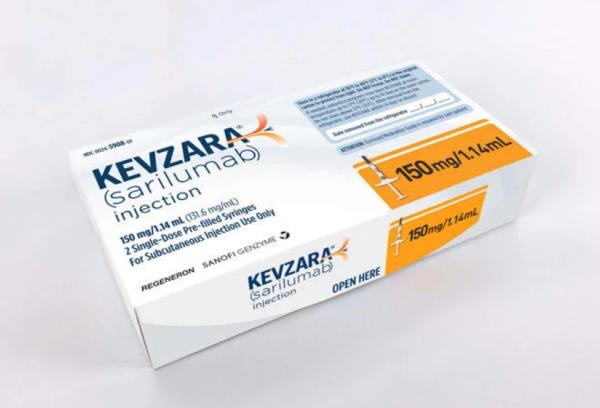Sarilumab Disease Interactions
There are 7 disease interactions with sarilumab.
- Infections
- Tuberculosis
- Blood disorders
- Diverticulitis
- Hepatic impairment
- Hyperlipidemia
- Renal dysfunction
Sarilumab (applies to sarilumab) infections
Major Potential Hazard, Moderate plausibility. Applicable conditions: Infection - Bacterial/Fungal/Protozoal/Viral
Serious and sometimes fatal infections due to bacterial, mycobacterial, invasive fungal, viral, or other opportunistic pathogens have been reported in rheumatoid arthritis patients receiving sarilumab; the most common serious infections reported included pneumonia and cellulitis. Use of sarilumab should be avoided in patients with an active infection, including localized infections. The risks and benefits of treatment should be considered before starting sarilumab in patients: with chronic/recurrent infection, who have been exposed to tuberculosis, with history of serious/opportunistic infection, who have resided/traveled in areas of endemic tuberculosis/mycoses, or with underlying conditions that may predispose them to infection. Patients should be closely monitored for signs/symptoms of infection during sarilumab treatment as signs/symptoms of acute inflammation may be reduced due to suppression of acute phase reactants. If a serious infection or an opportunistic infection develops, sarilumab should be interrupted until the infection is controlled. A patient who develops a new infection during treatment with sarilumab should undergo prompt and complete diagnostic testing appropriate for an immunocompromised patient; appropriate antimicrobial therapy should be started, and the patient should be monitored closely.
References
- (2018) "Product Information. Kevzara (sarilumab)." sanofi-aventis, SUPPL-1
Sarilumab (applies to sarilumab) tuberculosis
Major Potential Hazard, Moderate plausibility. Applicable conditions: History - Tuberculosis, Tuberculosis -- Active, Tuberculosis -- Latent
Sarilumab should not be given to patients with active tuberculosis (TB) infection. Patients should be evaluated for TB risk factors and tested for latent infection before starting sarilumab and during therapy; if positive for latent TB, patients should be treated with standard antimycobacterial therapy before starting sarilumab. Anti-TB therapy should be considered prior to starting sarilumab in patients with history of latent/active TB in whom an adequate course of treatment cannot be confirmed, and for patients with a negative test for latent TB but having risk factors for TB infection. Consultation with a physician with expertise in TB may be appropriate when considering anti-TB therapy. Patients should be closely monitored for signs/symptoms of TB, including patients who tested negative for latent TB infection prior to initiating therapy.
References
- (2018) "Product Information. Kevzara (sarilumab)." sanofi-aventis, SUPPL-1
Sarilumab (applies to sarilumab) blood disorders
Moderate Potential Hazard, Moderate plausibility. Applicable conditions: History - Blood Dyscrasias, Thrombocytopenia, Neutropenia
The use of sarilumab is associate with higher incidence of decrease in absolute neutrophil count (ANC), including neutropenia and thrombocytopenia. It is recommended to assess neutrophil count and platelet count prior to initiation of therapy and monitor these levels 4 to 8 weeks after start of therapy and every 3 months thereafter. Dose modification may be necessary based on the pharmacodynamics of the changes in ANC. Care is recommended when using this agent in patients with blood disorders.
References
- (2017) "Product Information. Kevzara (sarilumab)." sanofi-aventis
Sarilumab (applies to sarilumab) diverticulitis
Moderate Potential Hazard, Moderate plausibility. Applicable conditions: Gastrointestinal Diverticula, Gastrointestinal Obstruction
Gastrointestinal (GI) perforations have been reported with the use of sarilumab. GI perforation risk may be increased with concurrent diverticulitis or concomitant use of NSAIDs or corticosteroids. Assess patients for gastrointestinal complications prior to beginning therapy and promptly evaluate patients presenting with new onset abdominal symptoms.
References
- (2017) "Product Information. Kevzara (sarilumab)." sanofi-aventis
Sarilumab (applies to sarilumab) hepatic impairment
Moderate Potential Hazard, Moderate plausibility. Applicable conditions: Liver Disease
The use of sarilumab is associate with transaminase elevations; therefore, treatment with sarilumab is not recommended in patients with active hepatic disease or hepatic impairment. It is recommended to assess ALT/AST levels prior to initiation of treatment and monitor ALT and AST levels 4 to 8 weeks after start of therapy and every 3 months thereafter. When clinically indicated, consider other liver function tests such as bilirubin. Dose modification based on transaminase elevations might be warranted. The safety and efficacy or sarilumab have not been conducted in patients with hepatic impairment, including patients with positive HBV or HCV serology.
References
- (2017) "Product Information. Kevzara (sarilumab)." sanofi-aventis
Sarilumab (applies to sarilumab) hyperlipidemia
Moderate Potential Hazard, Moderate plausibility.
The use of sarilumab is associate with increases in lipid parameters such as LDL cholesterol, HDL cholesterol and/or triglycerides. Care should be exercised when using this agent in patients with lipid abnormalities. It is recommended to assess lipid parameters at baseline and parameters approximately 4 to 8 weeks following initiation of treatment, then at approximately 6 months intervals.
References
- (2017) "Product Information. Kevzara (sarilumab)." sanofi-aventis
Sarilumab (applies to sarilumab) renal dysfunction
Moderate Potential Hazard, Moderate plausibility.
Monoclonal antibodies, including sarilumab, are not eliminated via renal pathway. No dose adjustment is required in patients with mild to moderate renal impairment. The use of sarilumab has not been evaluated in patients with severe renal impairment. Care should be exercised.
References
- (2017) "Product Information. Kevzara (sarilumab)." sanofi-aventis
Sarilumab drug interactions
There are 264 drug interactions with sarilumab.
Sarilumab alcohol/food interactions
There is 1 alcohol/food interaction with sarilumab.
More about sarilumab
- sarilumab consumer information
- Check interactions
- Compare alternatives
- Reviews (29)
- Side effects
- Dosage information
- During pregnancy
- Drug class: antirheumatics
- Breastfeeding
- En español
Related treatment guides
Drug Interaction Classification
| Highly clinically significant. Avoid combinations; the risk of the interaction outweighs the benefit. | |
| Moderately clinically significant. Usually avoid combinations; use it only under special circumstances. | |
| Minimally clinically significant. Minimize risk; assess risk and consider an alternative drug, take steps to circumvent the interaction risk and/or institute a monitoring plan. | |
| No interaction information available. |
Further information
Always consult your healthcare provider to ensure the information displayed on this page applies to your personal circumstances.


